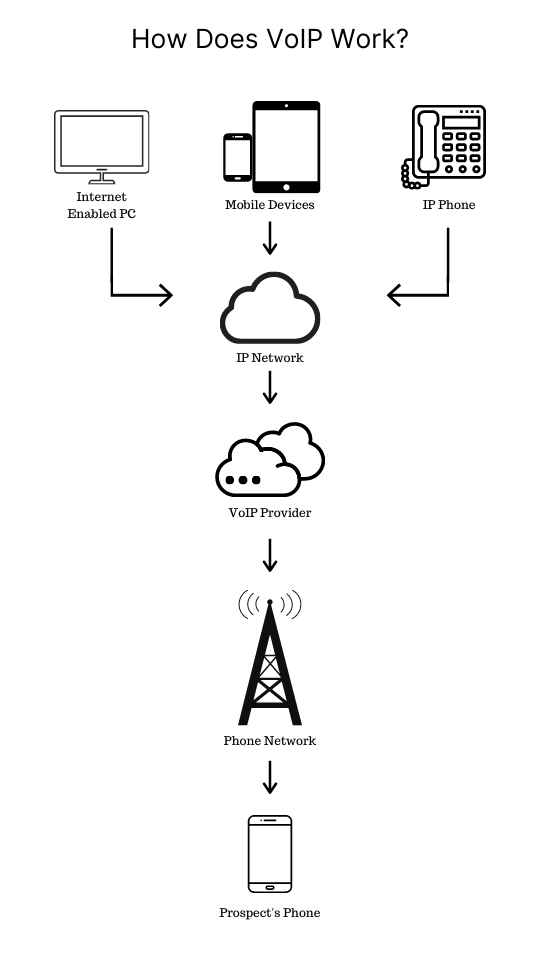When you work in an office you probably have a phone sitting on your desk. Think about it: how’s the call quality? Do you ever lose or drop calls? Does the whole system just seem dusty and old? If you answered yes to any of those questions, you are probably on the hunt for an improvement. In your search, you may have come across VoIP and wondered, What is that?
VoIP is a weird-sounding abbreviation for a very simple concept: internet-powered phone service. Voice over Internet Protocol (VoIP) enables users to have phone conversations over the same internet you’re already paying for. You might even be familiar with the “IP” part of the acronym: it relates directly IP addresses, a unique identification number which every device connected to a network has.
With VoIP, you can make phone calls exactly like you’re used to doing—but with less hassle and far more flexibility. For instance, with the right software, you can make phone calls with your laptop. And no, the person your calling does not have to have an internet-powered phone in order to receive your call. More on that in a minute.
Suffice it to say that VoIP is a powerful tool for businesses of all types but especially those that:
- Rely heavily on their phones
- Have employees who travel or work from home frequently
- Are already paying for internet services or are spending too much for landline
- Have determined their current phone system is inadequate or has reached the end of its life.
Companies that exhibit one or more of these traits should considering making the switch to internet-powered phone services for the reasons we’re about to get into.
Top Benefits to Consider
So, why should you consider making the switch from landline to VoIP? Atlantech writer Tom Collins offers his top six benefits of switching. They are:
- Low Cost-Per-Call – The first benefit of using a VoIP system is the low cost. VoIP has a low cost because it utilizes the internet you are already paying for and gets rid of the extra cost of using telephone lines. Phone companies love to charge you extra for business features that they know you need. Companies that switch to VoIP from an ISDN system report a 78% reduction in call expenditures
- Enhanced Mobility – Whether your team members are on the go or working from home, they are able to access their phone without calling the phone company to transfer numbers. You have the freedom to up and leave as your business demands it.
- Versatile – The versatility VoIP offers allows users to be flexible and multi-task. While waiting on hold, you can read voicemail-to-text transcriptions sent to your inbox, forward messages, or scroll through your contacts. There are many more features you can add and drop with ease.
- Conference Calls Simplified – VoIP is a cost-effective way of creating and participating in conference calls. You won’t have to pay for an additional service to host multiple callers for a conference. Instead, it is an added benefit for something you already pay for. Video calls are also made easier with VoIP.
- Interaction Efficiency – With people working from anywhere, VoIP makes it easier to get ahold of people. It also helps organize your incoming calls. You can choose where your calls ring and how. Maybe you want calls to get routed to your cellphone after three rings to make you miss fewer calls.
- Reliable – This alleviates one of the biggest concerns people have about internet-powered phones. Even if you find yourself somewhere without internet—maybe the office internet goes out—you can have your calls forwarded somewhere else, such as a mobile device or laptop.
In summary, VoIP is a cost-effective option for businesses with remote or on-the-go workers. It gives you powerful ways to communicate with your clients, partners, and vendors. And with VoIP, there is no longer a need to run new telephone lines to every workstation. Since you don’t rely on traditional landlines, VoIP has no geographical limitations.
Deliver Exceptional Service to Your Customers
As a business leader, the thing that should get you the most excited about VoIP is the capacity to do tremendous things for your customers. They want to hear from you. More importantly, they want to be able to hear you. VoIP phone quality is an improvement over the traditional landline, using your high-speed internet to connect with clients.
Your clients have high expectations. They want to be able to reach you when needed, but if you’re a frequent traveler, you may struggle with availability. Nothing is more frustrating than playing phone tag with somebody. Handing out your cell number isn’t always ideal either. If not for privacy reasons, you might lose service as you travel, not solving the problem you had in the first place.
Once you are set up with VoIP, you can take calls anywhere you have internet. That doesn’t mean you have to be out on a business trip; it can be right inside your own home. Many remote workers find it convenient that they can just bring their IP phone home with them, plug it in, and get working like nothing changed. And during a pandemic, this flexibility is irreplaceable.
Do more than just answer calls with VoIP. Nextiva has a list of over 40 features that are frequent options for hosted phone service customers. They include auto attendants, IVR, voicemail, conference calling, call waiting/forwarding/parking, and user presence to name just a few features. And since these features can be activated as you grow, the possibilities for serving your customers’ needs are endless.
Your Call Recipients Don’t Have to Change a Thing
By now, you might be thinking to yourself that internet-powered phone service sounds too good to be true. After all, there’s got to be a catch. Ah, that’s it! It must be that my customers, vendors, etc. need to change something on their end as well.
They actually don’t. What a relief, right? And the reason why your call recipients don’t have to change a thing comes down to how VoIP works.
When you use a hosted phone service, there is a VoIP provider that “sits” between you and the regular public telephone network. You speak into your phone like normal, and the VoIP phone turns your voice into digital packets and sends them over the internet. The VoIP provider then connects and transmits your voice over the phone network.

Communication is at a Premium During A Crisis
Even before businesses had huge digital footprints, communication was an absolute necessity for success and growth. A business cannot get anywhere without a shared sense of purpose and clear way to interact with the outside world. There needs to be a way for managers to communicate objectives to the employees they supervise, a way for workers to express their concerns and share their accomplishments, and a way for customers, prospects, vendors, and partners to know what’s happening within your business.
And the need for clear communication has never been more pronounced—and hard to come by. The pandemic has forced us out of our offices and into our homes, complicating communication channels substantially. We’re working from home (meaning no commute!) but somehow have less time on our hands than ever. How does that work?
With a simpler, more flexible solution to communications, your remote workforce can make the best use of that time. When you master business communications, here are some of the things that can happen:
- Employee productivity and engagement goes up
- Important information does not get lost
- Communication between departments improves
- Company culture is promoted
- Customer satisfaction and retention increases
What Do I Need to Get Started?
Getting set up with VoIP is generally a simple, painless process. Here’s what you’ll need:
- A reliable internet connection – Nextiva recommends a minimum of 5-10 Mbps per ten concurrent calls.
- A VoIP provider (of course) – You’ll have to make your choice. See our suggestion below.
- Either an on-site or a hosted PBX (Private Branch Exchange) – Your VoIP provider can either install a private server on your premises and connect all your phones to it or they can go the simple route of hosting a PBX. With this option, your phones just need to be connected to the internet.
- Your equipment – This you’ll need to buy or rent if you don’t have it already. Your shopping might take you across the Digium D65, an excellent Gigabit phone for mid-level users.
When it comes to selecting your VoIP provider, there’s a lot of options out there vying for your attention and dollars. How do you know which one’s the best? Well fortunately, you don’t have to decide if you don’t want to. The alternative to shopping for and setting up VoIP on your own is to partner with a managed service provider (MSP). Check that they offer VoIP as a business communications solution. If they do, they have done your homework for you and have already built a relationship with the VoIP vendor. They’ll be able to facilitate your transition to a sleek, modern phone system and as your business leverages IT to fuel its growth, help you overcome your other obstacles as well.



